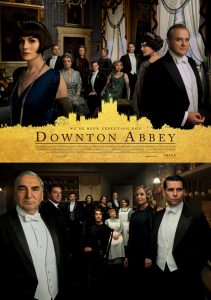Downton Abbey-2019
Director Michael Engler
Starring Hugh Bonneville, Michelle Dockery, Maggie Smith
Scott’s Review #947
Reviewed October 16, 2019
Grade: B+
Capitalizing on the tremendous success of the television series, which ended in 2015, Downton Abbey (2019) is a British historical period drama film written by Julian Fellowes, creator and writer of the series.
Beloved fans will devour the film, as the familiar formula and characters are brought to the big screen, giving it an even grander feel.
The film plays more like a two-hour episode arc over reinventing the wheel, but the result is a resounding crowd-pleasing affair with drama, scandals, and a good dose of nostalgia.
The Crawleys and their servants reside in the lavish fictional estate of Downton Abbey during the year 1927, a year and a half after the series ended.
Little has changed, and most of the characters are in similar situations, enjoying their daily lives.
Robert (Hugh Bonneville) and Cora Crawley (Elizabeth McGovern), the Earl and Countess of Grantham, are notified that King George V and Queen Mary will visit their home as part of a royal tour throughout the country.
The family and staff are excited yet skittish as they prepare to ensure the lavish event goes off without a hitch.
Situations arise such as the Downton Abbey servants feuding with the Buckingham Palace staff, Violet Crawley’s (Maggie Smith) dismay at Robert’s cousin Maud (Imelda Staunton) being in attendance, and attempted plot to kill the King which is thwarted by Tom (Allen Leach).
A new job offer for Edith’s (Laura Carmichael) husband, Mary’s (Michelle Dockery) frustration with maintaining the vast estate, and potential romances for several characters, including a scandalous same-sex relationship.
A few contemporary issues are created – among them, women’s rights and the plight of gay men. And though welcome, neither changes the overall blueprint of what the series is about, which is just what the series fans ordered.
Smith is the main attraction as she chews up the scenery with her insults, sarcasm, and blunt honesty. But the best scene, coming late in the film, gives Smith a chance to burst with sentimentality and limit the hamminess for at least one treasured scene.
The costumes and art direction are lovely, with luscious gowns, tuxedos, suits, jackets, hats, and shoes found in every scene.
The sprawling grounds of Downton Abbey and the ravishing interiors are front and center.
The film ventures to the neighboring city of York to offer a more progressive and metropolitan vibe, but each scene looks perfect, which is what fans have come to expect.
Not every character is front and center, but with an unwieldy cast of close to thirty principals, some are destined to accept back-burner status.
Surprisingly, yet agreeably, is the toned-down story for “super-couple” Bates (Brendan Coyle) and Anna (Joanne Froggatt), having enjoyed their share of trials and tribulations during the original run.
Wonderful moments feature supporting characters like Carson (Jim Carter), Thomas (Robert James-Collier), and Molesley (Kevin Doyle), who nearly steals the show with his hysterical fascination with royalty.
The balance and pace of the film are nearly perfect, and every character has at least something to do.
This characteristic has always helped huge ensemble casts succeed, and Fellowes wisely balances humor with drama but avoids tragedy or dark situations, hoping for mainstream success with his move to the big screen, opting to play it safe.
The attempt succeeds as the film adopts the “if it ain’t broke, don’t fix it” approach.
Downton Abbey (2019) is a splendid winner, primarily due to its impressive production values and costumes.
For fans of the television series, the film is a must-see and offers no more or no less than expected, providing more than enough to please those who want what the popular stories initially offered.
Despite the drama, the film does not feel “soapy” or contrived, and the tender moments may evoke a need for a hankie.
If the writing can remain fresh, I see no reason for another offering not to be green-lit, primarily due to the significant box-office returns.
